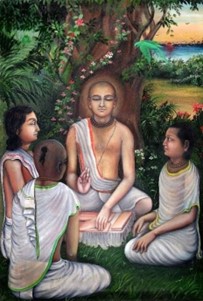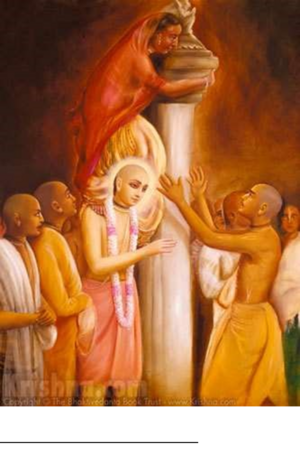Talk:Ananya Bhakti - Single Pointed Devotion
By Vishal Agarwal
The Bhakti Yogī has a single focus in his life – the Lord. His heart, mind, senses and his ātmā are all directed towards his love, Bhagavān, alone.
Krishna said: But Pārtha, the Mahātmās (great-souled) who have taken refuge in My divine nature, worship Me with an undistracted mind, knowing Me as the inexhaustible source of all beings. Gita 9.13 Having reached that state of supreme love for the Lord, the Bhakta sees the Lord alone, hears Him alone, speaks of Him alone and thinks of Him alone. Nārada Bhakti Sūtra 55
In fact, whatever he sees, hears etc., reminds him of his Beloved Lord. He honors, loves anything and everything that reminds him of Him. For example,
Through Fondness for Him, and the deer and the lotus which resembled Him, King Ikshavāku showed high esteem even towards the cloud which was of the same color as Krishna. Nrsimha Upapurāṇa 25.22
Raskhān prays in a Hindi (Braj) verse (called ‘savaiyyā’) that whichever form he is reborn into, he stays in Vrindāvan where Krishna spent his childhood-
If I am reborn as a stone, may I lie on the Govardhan mountain which Krishna had picked due to Indra’s deluge. If I am born as a bird, may I dwell on the Kadamba trees on the banks of Yamuna. If I am reborn as an animal, may I graze always among the cows of Nanda.
In the Vishnu Purāṇa, when Bhagavān Vishnu offered a boon to Prahlāda, he asked for the following-
Protector! Achyut! In my different lifetimes in whichever species I am born, may I always have unflinching devotion in You always. Just as they who are unable to distinguish the truth from the non-truth (avivekī) have unshakeable love to the objects of senses, in the same way, may I love You, so that I remember You always and You abide in my heart forever. Vishnu Purāṇa 1.20.18-19
The single focus of the Bhakta Yogī is consistent with rejection of anything else which distracts him from his supreme goal-
He relinquishes the results or fruit of his karmas, and even relinquishes his duties (i.e. attachment to duties). He overcomes pairs of opposites (like praise and censure). He even gives up the performance of Vedic ceremonies and chanting and instead focusses solely on loving the Lord deeply. Nārada Bhakti Sūtras 48-49
If at all he pursues these other activities, he does so in order to set an example for the lay people around him lest they start believing that performance of Yajnas etc., are of no use.
Story: Sant Meerābāī Schools Jīva Goswāmī
Jiva Gosvami, a disciple of Chaitanya Mahaprabhu and a devotee of Krishna, was a great saint and a scholar of the holy town of Vrindavan. Even the Mughal Emperor Jehangir (1605-1628 CE) held him in high regard. Hearing the fame of a fellow devotee of Krishna, Saint Meerabai once came to see Jiva Gosvami. But she was stopped at the entrance by one of his disciples, who said, “Our Guru says that he has completely renounced the world and all of its temptations. Therefore, he does not meet any woman.” Meerabai replied, “I had thought that there is only one man in Vrindavan – Krishna. Everyone else is a maid serving Him. So who is this second man that does not want to see me?” When Jiva Gosvami heard her, he came out to meet her respectfully. He realized that one who is devoted to Krishna alone has no possibility of getting attracted towards anything else in this world[1].
Single Pointed Devotion of an Eager Lady Bhakta
One day, it was the time of the Arati in the Jagannatha Temple. A huge crowd of Bhaktas stood in the Mandir and outside it, singing the Arati with devotion, waving lamps and throwing flowers at the Mūrti. A woman devotee came late and was not able to make her way through the crowd to get a darshana of Bhagavān Jagannatha. She climbed the GarudaStambha[2] and started chanting the Arati with great devotion. She was so lost in singing the devotional songs, that she did not realize that she had put her other foot on the shoulder of Chaitanya Mahaprabhu, a saint who was also standing next to the pillar and singing the Arati.
The saint stood still so that the lady does not get disturbed. But his student Govind got very upset at what he regarded as an insult to his Guru. He said to the lady, “Aren’t you ashamed at having put your feet on the shoulder of a Saint?” When the lady realized this, she immediately came down the pillar and fell at the feet of Chaitanya Mahaprabhu, asking for forgiveness with tears in her eyes.”
But the saint replied, “Do not fall at my feet lady. I am the one who should fall at your feet. One should learn true devotion, faith and dedication from you. In your eagerness to worship Bhagavān, you did not even realize what else was around you because your entire attention was focused on Bhagavān. Indeed, this is how a true Bhakta is – his or her entire focus is on Bhagavān and not on anything else. I hope that one day even I will be able to focus all of my attention towards Bhagavān just like you.”


